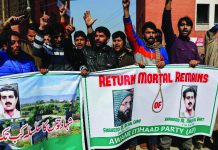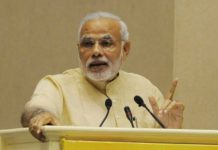 The Jawaharlal Nehru University Students’ Union is planning to boycott the semester examinations scheduled from December 12 to protest against the hostel fee hike, with the JNU on December 3 saying that students not appearing in the exams will lose their studentship. In a circular, the university cautioned the students “about the consequences of not completing academic assignments and tests, including end-semester examinations, as per the relevant academic ordinances and rules”.
The Jawaharlal Nehru University Students’ Union is planning to boycott the semester examinations scheduled from December 12 to protest against the hostel fee hike, with the JNU on December 3 saying that students not appearing in the exams will lose their studentship. In a circular, the university cautioned the students “about the consequences of not completing academic assignments and tests, including end-semester examinations, as per the relevant academic ordinances and rules”.
Students not appearing in the examinations will lose their studentship as per JNU academic ordinances, the university said. “Such students will be ineligible to register in the next semester and hence will cease to be the bonafide students of the university,” the circular read.
“This is also to remind the research scholars that the M. Phil students who fail to secure a CGPA of 5.00 on completion of course work at the end of 2nd semester will find their names automatically removed from the roll list of the university,” it stated.
The JNUSU, which has been protesting for over a month against the proposed hike in hostel fee, said at least 17 centres have held meetings and supported the call for boycott of semester exams. In its circular, the university said the last date for submission of M.Phil, dissertation/PhD thesis in the schools/centres and forwarding the same to Evaluation Branch is December 31 for the Monsoon Semester.
“This needs to be noted that the University academic calendar has been approved by the the Academic Council and the Executive Council and is required to be followed strictly,” the circular read.
Earlier, the Human Resources and Development (HRD) Ministry has asked the high-powered committee appointed by it to compare the hostel fee structure of JNU, after the second rollback, with other central universities. The ministry communicated this to the three-member committee in a letter on December 3. “We have sought a clarification on the matter. The members will have to analyse the fee structure of different universities and get back to us. They have not been given any deadline,’ an official said.
The university has been witnessing a stand-off between the administration and students over a hike in the hostel fee. The students have demanded a complete rollback of the hike. The high-powered committee, constituted by the Human Resource Development (HRD) Ministry to restore normal functioning of JNU, had submitted its report last week.
Sources said the details sought by the HRD Ministry are separate from the report. The committee will hold a meeting to decide on the universities it will take into consideration for comparison and will be only comparing their hostel fees with that of JNU. JNU has constituted an internal seven-member high-level committee to look into the issue. In its report, the committee recommended a 50-per cent concession in utility and service charges for all students and 75-per cent concession for students below poverty line.
This was the second rollback announced by the varsity. The first rollback was announced in mid-November. Students have rejected both the rollbacks and have been on a strike for over a month against the fee hike. The JNU Students’ Union has said almost 17 centres have decided to boycott the semester examinations scheduled to start from December 12.
The Jawaharlal Nehru University (JNU) administration has been appealing to agitating students to immediately call off their strike and said it had received “letters and messages from several bona fide students who have expressed their anguish over the persistent agitation”.
End-semester examinations are to begin on December 12 and apprehensions are abound that the students, who are eagerly waiting for completing their academic requirements, will face
obstructions due to the ongoing agitation, JNU Registrar Pramod Kumar reportedly said.
“The JNU administration has been receiving letters and messages from several bona fide students who have expressed their anguish over the persistent agitation, lockdown of the administration building and forced closure of some schools by the agitators,” he was quoted as saying by a leading news agency.
He also shared mails purportedly written by some students expressing anguish over the prevailing situation. A physically challenged student has apparently written to the administration saying he has never participated in any kind of protest and has always wanted to attend classes but has not been able to do so owing to the shutdown over the hostel fee hike issue.
“… Now I am hearing rumours from social media and newspapers about students boycotting the examinations. If the university allows such a thing to happen, it would be great injustice to those who have always been regular and sincere in the classes and have not supported any such activities which disrupt the normal functioning of the university,” the student, whose name was withheld by the administration, has written.
He also urged the administration to ensure that his “academic rights of attending classes and taking examinations should not be allowed to be compromised” because of the “coercive methods” adopted by those who wish to disrupt the peaceful academic environment on the campus.
In a separate letter, another student has apparently demanded strict action against those who stop the university’’s academic and administrative activities by “coercive means”.
“All protests which violate university rules and high court order should not be allowed on the campus,” the student has written. He assured the students that end-semester examinations will be held as per the schedule from December 12.
In a separate development, the Delhi High Court has refused to direct the AAP government to grant sanction for prosecution of former JNU Students’ Union president Kanhaiya Kumar in a sedition case. A bench of Chief Justice D N Patel and Justice C Hari Shankar said it cannot pass any direction in this regard and it is for the Delhi government to decide as per existing rules, policy, law and facts of that case on whether to grant approval for prosecution.
The court, while disposing of the petition, said it appeared that the petitioner, former BJP MLA Nand Kishor Garg, has some personal interest in the FIR lodged against Kumar and others in relation to the JNU sedition case of 2016. The plea has sought issuance of guidelines ‘for expeditious disposal of criminal cases of serious nature where there is involvement of the influential persons as accused’.
On this, the court said it sees no reason to direct the government for such guidelines over and above the existing law. It said there are adequate number of judgements rendered by the various courts on this. The petition, filed through advocate Shashank Deo Sudhi, alleged that Kumar’s case highlights the lackadaisical approach of the government as it has ‘failed’ to grant the sanction letter which is required prior to taking cognisance of the charge sheet.
The court also refused to direct the Delhi government to constitute a high-powered committee to look into the aspects of delay in the procedural compliances which leads to delay in the administrative process for grant of sanction in criminal cases. The bench said it sees no reason to direct the government to constitute a high-powered committee as the State has got enough number of officers and there is no need of a super panel.
The police, on January 14, had filed a charge sheet in the court against Kumar and others, including former JNU students Umar Khalid and Anirban Bhattacharya, saying they were leading a procession and supported seditious slogans raised in the university campus during an event on February 9, 2016.
letters@tehelka.com













